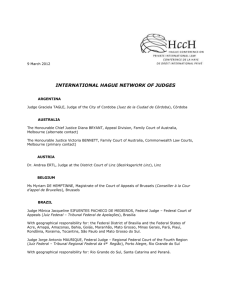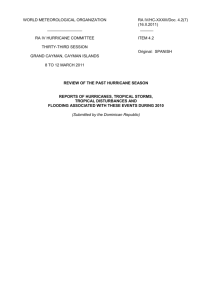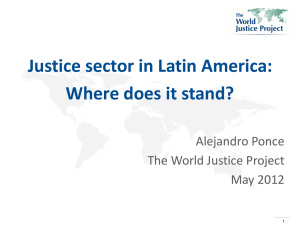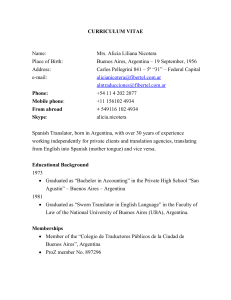International Court of Justice - Inicio
advertisement
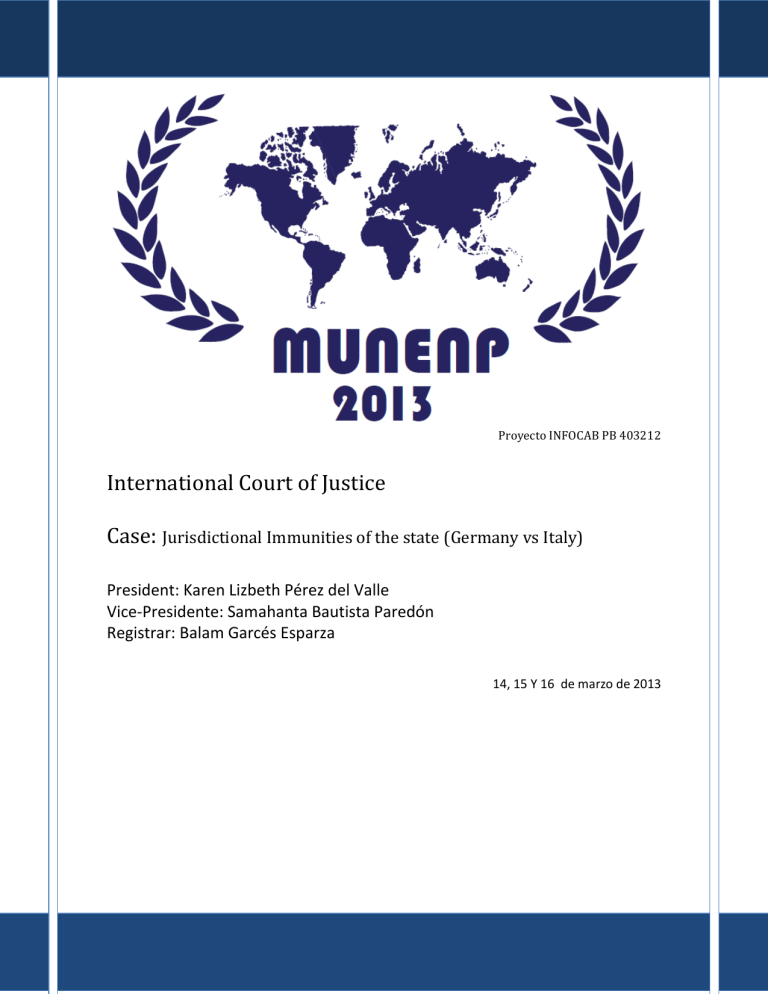
Proyecto INFOCAB PB 403212 International Court of Justice Case: Jurisdictional Immunities of the state (Germany vs Italy) President: Karen Lizbeth Pérez del Valle Vice-Presidente: Samahanta Bautista Paredón Registrar: Balam Garcés Esparza 14, 15 Y 16 de marzo de 2013 "Educar para la paz es imaginar nuevas formas más solidarias y justas de sociedad; y de elaborar y ensayar hipótesis a las problemáticas mundiales.” José Tuvilla Rayo Estudiantes, Académicos y Observadores: De parte de todos los que trabajamos en este proyecto pedagógico, con la firme intención de educar para la paz, les damos la más cordial bienvenida al 2° Foro Interamericano y 4° Modelo de Naciones Unidas de la Escuela Nacional Preparatoria. Dice el Dr. José Narro Robles, rector de la Universidad Nacional Autónoma de México, en su Plan de Trabajo 2011-2015 Por fortuna la comunidad universitaria no vive sólo de su pasado relevante. Por el contrario, su compromiso es con el futuro. Nuestro mayor interés tiene que ver con los jóvenes y con los niños, con los que ahora estudian e incluso con las generaciones que todavía no nacen. Muchos de nosotros compartimos la preocupación por lo que les vamos a dejar para hacer frente al futuro, a los próximos desafíos. Darles a los jóvenes la oportunidad de participar en un foro y en un ejercicio de simulación, que les permita discutir y profundizar, no solo sus relaciones interpersonales o sus conocimientos, sino profundizar en la toma de conciencia, de la empatía, de la resolución de problemas, en cooperación con un punto común: La cultura de la Paz. Siguiendo esencialmente esta idea de nuestro rector, y las líneas rectoras correspondientes al Plan de Desarrollo de la Universidad 2011-2015, Línea Rectora N° 1 “Mejorar la calidad y pertinencia de los programas de formación de los alumnos de la UNAM e incrementar la equidad en el acceso a aquellos métodos, tecnologías y elementos que favorezcan su preparación y desempeño“ y la línea N° 9 “Incrementar la proyección internacional de la UNAM mediante el aumento sustancial en el número de intercambios de académicos y alumnos, al igual que a través del establecimiento de redes y programas de colaboración”, es como sigue concibiéndose y desarrollándose este proyecto. No queda más que desear que su estancia y su aprendizaje, sea lo más gratificante posible, reiterándoles siempre nuestro compromiso de AMOR, ORDEN y PROGRESO. “Por mi raza hablará el espíritu” ATENTAMENTE Comité Organizador MUNENP 2013 “Valor es lo que se necesita para levantarse y hablar, pero también es lo que se requiere para sentarse y escuchar.” Winston Churchill Estimados delegados, ministros y jueces, Es un placer para mí, poder darles la bienvenida a la cuarta edición del Modelo de Naciones Unidas de la Escuela Nacional Preparatoria. MUNENP se ha convertido en uno de los eventos académicos más esperados para la comunidad preparatoriana interesada en debatir y encontrar soluciones a problemas que afectan a la comunidad internacional, debido a que MUNENP les ofrece un espacio para verter opiniones y propuestas que estén llenas del espíritu joven, innovador y valiente que caracteriza a nuestra comunidad. En pasadas ediciones he participado como delegado, mesa y esta vez en un honor ser el Secretario General de tan noble evento, por ello es que MUNENP representa para mí el crecimiento y la evolución que puede tener un alumno, como muchos, de la Escuela Nacional Preparatoria con dedicación, esfuerzo y trabajo. Por eso los invito a que durante los tres días de debate en sus respectivos comités sean estas acciones las que predominen y sean el camino para lograr exitosas resoluciones a problemas que por intereses lejanos a lo humano no han podido terminar. Para la realización de este festejo a la libertad de expresión y a la creación de soluciones, hemos tenido el apoyo de funcionarios importantes de nuestra alma máter, así mismo académicos y alumnos de nuestra Universidad han trabajado por muchos meses para la realización de MUNENP. Así que quiero dar un reconocimiento a todos ellos que nos han regalado su tiempo y trabajo para que juntos cumplamos el sueño de ser mejores personas, más consientes, más inteligente y sobre todo más sensibles a nuestros semejantes después de tres días de profundizar en hallar una mejor respuesta a aquellas preguntas que muchos, por falta de conocimiento o de valor, no se atreven a contestar. Este año en MUNENP hemos decidido plantear temas controversiales y que estimularán la sensibilidad política y habilidades de negociación de nuestros delegados. Además, con el objetivo de que los delegados desarrollen al máximo su oratoria, redacción y habilidades de liderazgo es que decidimos que los tópicos fueran de gran interés para la juventud y además fueran altamente competitivos para el nivel educativo que cursamos. Finalmente lo único que me resta es desearles que disfruten de MUNENP 2013. Siéntanse orgullosos de ustedes mismos por haber tomado la iniciativa de participar en un foro para dar todo de ustedes, su conocimiento, su interés, sus ideas y sobre todo su corazón. Atentamente Rodrigo Arturo Salazar Chávez Secretario General de MUNENP 2013 “A quality of justice is to make it soon and without delay, make it wait is injustice.” Jean de la Bruyere (1645-1696) French writer. “To change the world, friend Sancho, it´s not madness nor utopia. It´s justice” Miguel de Cervantes (1605-1615) Don Quijote. Dear Justices and Agents: The International Court of Justice of MUNENP 2013 is pleased to welcomed you to this committee, it is an honour and a pleasure to have you with us. The case of this year concerns on Jurisdictional Immunities (Germany v. Italy). Italian Courts have judge german nationals for occurrences during the Third Reich in the World War II, for that reason The Federal Republic of Germany request to the Court that Italy lacks of jurisdiction on it. This is for you an opportunity to participate in the international disputes, and solving it, is very important not only for the European Union but also for the international community, this particular case requires our full attention, international legal knowledge, good will, and impartiality to settle this dispute. The President, Vicepresident and the Registrar of this honorable Court is pleased to have you with us solving this international dispute. We are honored to solve international legal disputes closely with every Justice and Agent to assure an excellent Court. Please address any request, doubt or concern at munenp2013@hotmail.com Fully honored, we are at your disposal for the preparation of the case. Karen Lizbeth Pérez del Valle, President Samahanta Bautista Paredón, Vice President Balam Garcés Esparza Registrar INTERNATIONAL COURT OF JUSTICE MUNENP 2013 PRESIDENTE HONORARIO Dr. José Narro Robles Rector Universidad Nacional Autónoma de México MIEMBROS HONORARIOS M.C. Miguel Robles Bárcena Secretario de Servicios a la Comunidad Dr. Dante Jaime Morán Zenteno Dirección General de Asuntos del Personal Académico Dr. Ramiro de Jesús Sandoval Dirección General de Incorporación y Revalidación de Estudios. Mtra. Silvia Estela Jurado Cuellar Directora General Escuela Nacional Preparatoria Dra. Virginia Hernández Ricárdez Directora Escuela Nacional Preparatoria Plantel 1 “Gabino Barreda” Lic. Antonio Meza Director Escuela Nacional Preparatoria Plantel 2 “Erasmo Castellanos Quinto” Lic. Ligia Kamss Paniagua Directora Escuela Nacional Preparatoria Plantel 3 “Justo Sierra” Lic. Agustín Sánchez Orendáin Director Escuela Nacional Preparatoria Plantel 4 “Vidal Castañeda y Najera” Biol. Ma. Dolores Valle Martínez Directora Escuela Nacional Preparatoria Plantel 5 “José Vasconcelos” Mtra. Alma Angélica Martínez Pérez Directora Escuela Nacional Preparatoria Plantel 6 “Antonio Caso” Lic. Leopoldo Martínez González Director Escuela Nacional Preparatoria Plantel 7 “Ezequiel A. Chávez” Ing. Raymundo Velázquez Martínez Director Escuela Nacional Preparatoria Plantel 8 “Miguel E. Schulz” Mtra. María de los Ángeles Lara Arzate Directora Escuela Nacional Preparatoria Plantel 9 “Pedro de Alba” CONSEJO EJECUTIVO Mtra. Arcelia Moreno Agraz Coordinadora General Modelo Internacional de Naciones Unidas de la Escuela Nacional Preparatoria Lic. Enmanuel Santana Coordinador Taller, Educar para la Paz, desde el ejercicio de simulación de la Organización de las Naciones Unidas Coordinación Académica Mtra. Arcelia Moreno Agraz MBA. Luis Parra Pantoja Mtra. Mayra Santos Medina Biol. Esther de la Paz Pérez Farca QFB. Adriana María Treviño Valdés Lic. Rosario Benítez García Mtra. Rosa Pacheco García Lic. María de los Ángeles Castañeda González Dra. Gabriela Moreno Agraz Lic. Araceli Mejía Barrón MESAS Consejo de Derechos Humanos Presidenta: Rosalba García Martínez Moderadora: Valeria Pioquinto Morales Oficial de Conferencias: Arturo Jasso ORGANIZACIÓN DE LAS NACIONES UNIDAS PARA LA CIENCIA, LA CULTURA Y LA TECNOLOGIA, UNESCO Presidente: Oscar Genaro Macías Betancourt Moderador: Juan José Rivera Avendaño Moderador: Luis Alberto Llamas Moderadora: Patricia García Oficial de Conferencias: Ricardo Trujano Comisión de la Condición Social y Jurídica de la Mujer Presidente: Riquerny Luis Mota Mena Moderadora: Niyima Elizalde Guzmán Moderadora: Diana González Galván Oficial de Conferencias: Oscar Repizo San Emeterio Consejo Europeo de Ministros Presidenta: Patricia Angélica Quiles Moderadora: Isabel Torres Ramírez Moderadora: Paola Elizabeth Villanueva Jurado Oficial de Conferencias: Arturo del Río Treviño Security Council President: Montserrat Tapia Mena Moderator: Brenda Mireles Juárez Moderator: Alonso Cruz Confference Officer: Fernanda Castro International Court Of Justice President: Karen Lizbeth Pérez del Valle Vice-president: Samantha Bautista Paredón Registrar: Balam Garcés Esparza COMITÉ DE CRISIS Elba Gutiérrez Castillo Edgar Moreno Villanueva Israel Salazar Rosas América Zepeda Cabiedes COMITÉ DE EVALUACION (JURADO EVALUADOR) Mtra. Arcelia Moreno Agraz MBA. Luis Parra Pantoja Biol. Esther de la Paz Pérez Farca QFB. Adriana María Treviño Valdés Lic. Rosario Benítez García Mtra. Rosa Pacheco García Lic. María de los Ángeles Castañeda González Mtra. Mayra Santos Dra. Gabriela Moreno Agraz Lic. Araceli Mejía Barrón COORDINACION LOGISTICA Abraham Alejandro Gutiérrez Vázquez Apoyo al delegado y delegado internacional María del Rosario Navarrete Valeriano Maetzin Rodea González Coordinación de Pajes QFB. Adriana María Treviño Valdés Lic. Rosario Benítez García SECRETARIA GENERAL MUNENP2013 Rodrigo Arturo Salazar Chávez Carlos Augusto Hernández García Mesa Revisora Alfredo Maldonado García APOYO ACADÉMICO Víctor Manuel Miranda Leyva Samantha Monroy Mondragón Luis Adolfo Cid Rojas Cristian Yael Torres Frausto JUEVES 14 DE MARZO 10:00-12:00 REGISTRO DELEGADOS 13:00-14:00 CEREMONIA INAUGURACIÓN 14:00-15:45 COMIDA 16:00-17:00 1ª Sesión 17:00-17:15 Receso 17:15 - 19:00 2ª Sesión VIERNES 15 DE MARZO 9:00 – 10:15 3º Sesión 10:15 - 10:30 Receso 10:30 – 12:00 4º Sesión 12:00 – 12:15 Receso 12:15 – 13:45 5º Sesión 13:45 – 15:30 Comida 15:30 – 17:00 6º Sesión 17:00 – 17:15 Receso 17:15 – 18:30 7º Sesión SÁBADO 16 DE MARZO 9:00 – 10:30 8º Sesión 10:30 – 11:00 Receso 11:00 – 13:00 9º Sesión LUNCH 13:30-15:00 SESIÓN PLENARIA 15:15-16:00 CLAUSURA MUNENP 2013 AUDITORIO THE INTERNATIONAL COURT OF JUSTICE What is it? The International Court of Justice (ICJ) is the judicial organ of the United Nations (UN), and one of the six main organs of the United Nations with seat in The Hague, Netherlands. Its predecessor is the Permanent Court of International Justice, the judicial organ of the Society of Nations. What does the ICJ do? The International Court of Justice, solves LEGAL DISPUTES submitted to it by States and also gives ADVISORY OPINIONS to the other UNs organs and specialized Agencies in accordance with international law. Like any other court, the ICJ can only operate within the Statutorial limits that have been laid down for it. What is International Law? International Law are the sources recognized by the International community to regulate the relations between the States. The article 38 of the Statute of the Court recognizes as international law: ● International conventions ● International custom ● The general principles of law recognized by civilized nations ● Judicial decisions ● The teachings of the most highly qualified publicists of the various nations How many members have the ICJ? The International Court of Justice was established by the Charter of the United Nations (Chapter XIV, art. 92-96) which provides that all Member States of the United Nations are ipso facto parties to the Court's Statute. However the Court is composed of 15 judges, who are elected by the General Assembly and the Security Council. The Courts it´s also assisted by a Registry, a permanent administrative organ. How it works? The Court may entertain two types of cases: a) Legal disputes between states questions submitted to it by them Nations There are two parts in a contentious case: the Applicant, who declares that the other State is violating an international obligation, and the Respondent who declares otherwise. The representatives before the Court are known as agents. Any case can be submitted only when both applicant and respondent are States. Neither the United Nations or any of its specialized agencies can be a party in contentious proceedings before the ICJ. Currently, the Court is open to very State in the world, the States that have not signed the UN Charter can become parties to the Statute of the ICJ have to satisfy certain conditions laid down by the General Assembly upon the recommendation of the Security Council. b) Advisory opinions on legal referred to it by the United (cont entio us cases ) organ s and speci alized agenc ies (Advi sory proce eding s) These legal questions submitted by the court are open solely to five organs of the United Nations and to the specialized agencies of the UN according the Article 96 of the Charter of the UN. Advisory proceedings are governed by the Statute and the Rules of the ICJ, therefore they are similar to contentious proceedings. The ICJ has to remain faithful to the requirements of its judicial character and cannot depart from the essential rules that guide its jurisdictional activity. The Secretary-General of the requesting entity is required to send as soon as possible all documents to solve the case to the Court attached to at the same time as the request for an advisory opinion. When the Court receives a request for an advisory opinion it is entitled to held the pleadings and oral proceedings. The Advisory procedure is completed with the presentation of the Advisory Opinion in a public meeting. Contrary to judgements they have no binding effect. INTERNATIONAL COURT OF JUSTICE Vredespaleis, Carnegieplein 2, 2517 KJ Den Haag, Neederland Tel.: +31 (0)70 302 2323 Fax: +31 (0)70 364 9928 Website: www.icj-cij.org International Court of Justice Office of the Registrar The Hague, 23 December 2008 TO: Judges of the International Court of Justice The Federal Republic of Germany applies to the International Court of Justice in its dispute with the Italian Republic under jurisdictional Immunities of the State. Your Excellencies: The office of the Registrar informs you of the following important developments: Jurisdictional Immunities of the state (Germany v. Italy) Pursuant to Article 36, paragraph 1, of the Statute of the Court which established “The jurisdiction of the Court comprises all cases which the parties refer to it and all matters specially provided for in the Charter of the United Nations or in treaties and conventions in force”. In its Application the Federal Republic of Germany claims that: Through its Courts, specially the Corte di Cassazione, Italy has - and continues toinfringed its obligations towards Germany under international law. Italy cannot rely on any justification for disregarding the jurisdictional immunity which Germany enjoys under the principle of sovereign immunity that principle. Italy has breached its international obligations under the European Convention for the Peaceful Settlement of Disputes Article 1 and Article 27, announced before. We expect from both agencies to submit a memorial and counter memorial as briefly as possible. Your Excellencies will be notified if any additional information is received. In the course of the proceedings the Court shall decide if the Italian Republic: (1) by allowing civil claims based on violations of international humanitarian law by the German Reich during World War II from September 1943 to May 1945, to be brought against the Federal Republic of Germany, committed violations of obligations under international law in that it has failed to respect the jurisdictional immunity which the Federal Republic of Germany enjoys under international law; (2) by declaring Greek judgments based on occurrences similar to those defined above in request No. 1 enforceable in Italy, committed a further breach of Germany’s jurisdictional immunity. (3) the Italian Republic’s international responsibility is engaged; (4) the Italian Republic must declare that all the decisions of its courts and other judicial authorities infringing Germany’s sovereign immunity become unenforceable; (5) the Italian Republic must take any and all steps to ensure that in the future Italian courts do not entertain legal actions against Germany. Moreover, we recommend your Excellencies, to study Article 38 of The Statute of the International Court of Justice and the Charter of United Nations, it is indispensable for your participation on the committee. We ask your Excellencies to be prompt in confirming your presence and reading through the enclosed material. The hearings for oral pleadings regarding this case have been set on March 8, 9 and 10 of 2013, in special session of the Court, to be held during MUNENP 2013, in “Escuela Nacional Preparatoria” Av. Lomas de Plateros sin número, esquina Francisco P. Miranda, Colonia Merced Gómez, Delegación Alvaro Obregón C.P. 01600, Ciudad de México OFFICE OF THE REGISTRAR INTERNATIONAL COURT OF JUSTICE. INTERNATIONAL COURT OF JUSTICE APPLICATION INSTITUTING PROCEEDINGS filed in the Registry of the Court on 23 December 2008 Jurisdictional Immunities of the state (Germany v. Italy) ___________________ COUR INTERNATIONALE DE JUSTICE REQUÊTE INTRODUCTIVE D’INSTANCE enregistrée au Greffe de la Cour le 23 décembre 2008 IMMUNITéS JURIDICTIONNELLES DE L’éTAT (ALLEMAGNE c. ITALIE) LETTER FROM THE AMBASSADOR OF THE FEDERAL REPUBLIC OF GERMANY TO THE REGISTRAR OF THE INTERNATIONAL COURT OF JUSTICE German Embassy, The Hague, Netherlands. 22 December 2008. To: Mr. President Karen Lizbeth Pérez del Valle Excellency, On the behalf of the Federal Republic of Germany in accordance with Article 40, paragraph 1, of Statute of the Court and Article 38 of the Rules of Court, I have the honour to submit herewith an Application of the Federal Republic of Germany against the Italian Republic. The agents of the Federal Republic of Germany would be ready to attend a meeting of the Parties pursuant to Article 31 of the Rules of the Court at the Court’s earliest convenience. Please accept, Excellency, the expression of my highest consideration. Thomas Läufer, Ambassador of the Federal Republic of Germany. APPLICATION INSTITUTING PROCEEDINGS Subject of the Dispute The Federal Republic of Germany (hereinafter: Germany) hereby institutes proceedings against the Italian Republic (hereinafter: Italy) before the International Court of Justice. The Italian judicial bodies have repeatedly disregarded the jurisdictional immunity of Germany as a sovereign State. On March 2004 in the judgement of the Ferrini case, the Corte di Cassazione declared that Italy held jurisdiction with regard to a claim (proceedings initiated in 1998). After this judgment, numerous other proceedings were instituted against Germany before Italian courts by persons who had also suffered injury as a consequence of the World War II. All of these claims should be dismissed since Italy lacks jurisdiction in respect of acts jure imperii performed by the authorities of the Third Reich. However, the Corte di Cassazione has recently confirmed its earlier findings in a series of decisions.Repeated representations with the Italian Government have been of no avail. For that reason the Federal Republic of Germany decides to submit this dispute to the International Court of Justice. I. JURISDICTION The Application is brought under the terms of the European Convention for the Peaceful Settlement of Disputes of 29 April 1957 (hereinafter: European Convention). Italy ratified that Convention on 29 January 1960, Germany did so on 18 April 1961. None of the two Parties has denounced it. A) Article 1 of the European Convention provides: “The High Contracting Parties shall submit to the judgment of the International Court of Justice all international legal disputes which may arise between them including, in particular, those concerning : (a) the interpretation of a treaty ; (b) any question of international law ; (c) the existence of any fact which, if established, would constitute a breach of an international obligation ; (d) the nature or extent of the reparation to be made for the breach of an international obligation.” In the instant case, the dispute concerns about the rule under customary international law that protects sovereign States from being sued before the civil courts of another State. B) Article 27 of the European Convention, which enunciates certain time-limits. In fact, as stipulated there: “The provisions of this Convention shall not apply to : (a) disputes relating to facts or situations prior to the entry into force of this Convention as between the parties to the dispute ; (b) disputes concerning questions which by international law are solely within the domestic jurisdiction of States.” The objective of the Federal Republic of Germany is a judgement from the Court that to declare claims based on those occurrences as falling within the domestic jurisdiction of Italian courts, constitutes a breach of international law. II. ISSUES OF ADMISSIBILITY 1. No need for exhaustion of local remedies Germany does not act in the exercise of its right of diplomatic protection in favour of German nationals. It acts on its own behalf. Its sovereign rights have been — and continue to be — directly infringed by the jurisprudence of the highest Italian courts that denies Germany its right of sovereign immunity. The claims presented before the Italian Courts are against the German State as a legal entity, not against German nationals. Accordingly, there is no legal requirement for Germany to exhaust local remedies. 2. No need for prior exhaustion of diplomatic negotiations Article 33 of the United Nations Charter does not require States to find solutions to an actual dispute by all the methods listed therein before turning to the Court. Furthermore Article 4 (1) of the Articles on Responsibility of States for Internationally Wrongful Acts, elaborated by the International Law Commission (ILC) and taken note of by General Assembly resolution 56/83 of 12 December 2001, states unequivocally that conduct capable of entailing responsibility may emanate from any organ that “exercises legislative, executive, judicial or any other functions”. 3. No jurisdiction of the Court of Justice of the European Communities The relationship between the European nations must be governed by international law. Every Member State of the European Community/European Union is obligated to respect the general rules of international law. Jurisdictional immunity belongs to the core elements of the relationship between sovereign States. III. THE FACTS A) On September 8-9 of 1943, Italy terminated it´s alliance with Germany, after being under German occupation. Italy then, joined the Allied Powers and instituted proceedings seeking financial compensation for that harm. Three main groups of claimants may be distinguished: 1) Young men claimants who were arrested on Italian soil and send to Germany to perform forced labour. 2) Members of the Italian armed forces, who after the events of September 1943, were taken prisoner by the German armed forces and were deprived by the Nazi authorities as prisoners of war. 3) Victims of massacres perpetrated by German forces during the last months of World War II. 4) A fourth group of disputes must be mentioned separately, namely the disputes arising from the attempts by Greek nationals to enforce in Italy a judgment obtained in Greece on account of a similar massacre committed by German military units during their withdrawal in 1944 (Distomo case). B) The democratic Germany (emerged after the end of the Nazi dictatorship) has consistently expressed its deepest regrets over the egregious violations of international humanitarian law perpetrated by German forces during the period from 8-9 September 1943 until the liberation of Italy. C) Since 2004, the numbers have continually increased. Currently, roughly 250 claimants have introduced civil actions against Germany, which are pending before 24 regional courts and two courts of appeal. It stands to reason that Germany is thus involved in a continual confrontation which requires a huge amount of financial and intellectual expenditure. A special task force of lawyers had to be set up to follow the developments with their manifold ramifications. D) Having to observe the judicial practice of the Italian judges in the relevant cases, and to respond to it in an appropriate manner, has grown into a serious stumbling block adversely affecting the bilateral relationships between the two nations IV. THE CLAIMS OF THE FEDERAL REPUBLIC OF GERMANY Through its Courts, specially the Corte di Cassazione, Italy has - and continues toinfringed its obligations towards Germany under international law. Italy cannot rely on any justification for disregarding the jurisdictional immunity which Germany enjoys under the principle of sovereign immunity that principle. Italy has breached its international obligations under the European Convention for the Peaceful Settlement of Disputes Article 1 and Article 27, announced before. V. REQUESTS The Federal Republic of Germany prays the Court to adjudge and declare that the Italian Republic: (1) by allowing civil claims based on violations of international humanitarian law by the German Reich during World War II from September 1943 to May 1945, to be brought against the Federal Republic of Germany, committed violations of obligations under international law in that it has failed to respect the jurisdictional immunity which the Federal Republic of Germany enjoys under international law ; (2) by declaring Greek judgments based on occurrences similar to those defined above in request No. 1 enforceable in Italy, committed a further breach of Germany’s jurisdictional immunity. (3) the Italian Republic’s international responsibility is engaged ; (4) the Italian Republic must declare that all the decisions of its courts and other judicial authorities infringing Germany’s sovereign immunity become unenforceable ; (5) the Italian Republic must take any and all steps to ensure that in the future Italian courts do not entertain legal actions against Germany. Germany reserves the right to append other claims to the Court. Furthermore Germany reserves the right to request the Court to indicate provisional measures in accordance with Article 41 of the Statute should measures of constraint be taken by Italian authorities against German State assets, in particular diplomatic and other premises that enjoy protection against such measures pursuant to general rules of international law. The Hague, 22 December 2008. (Signed) Dr. Thomas Läufer, Ambassador of the Federal Republic of Germany.
